Samaaro + Your CRM: Zero Integration Fee for Annual Sign-Ups Until 30 June, 2025
- 00Days
- 00Hrs
- 00Min
Event check-in. The phrase often conjures images of long lines, frustrated attendees, and mountains of paper forms. Traditional manual processes are not only time-consuming and prone to errors, but they also fail to deliver a personalized experience for attendees. You don’t want to lose valuable event time in queues and miss out on the opportunity to make a lasting first impression. This is where badge printing software steps in.
Samaaro, a leading event management platform, is revolutionizing the check-in process by leveraging the power of QR codes and badge printing. This innovative solution goes beyond simple scanning, offering a streamlined, secure, and personalized experience for both attendees and organizers.
Our daily lives now involve QR codes, and Samaaro harnesses this potential to provide more than just basic check-in capabilities. Here’s how Samaaro’s QR codes elevate the experience:
Samaaro allows you to embed relevant attendee details like their name and contact number. This QR code is unique to each attendee and can unlock a range of interactive features, including check-in and networking.
Access control needs to be differentiated for multi-level events. Your access control system can be combined with Samaaro’s QR codes to guarantee that only authorized attendees are allowed entry to certain areas or sessions. This removes uncertainty and frustration by improving security and streamlining the event flow.
iii) Efficiency:
With Samaaro’s QR codes, check-in times are drastically cut down, which keeps the attendees moving. This frees up valuable staff time for other essential event tasks and ensures a smooth entry experience for everyone.
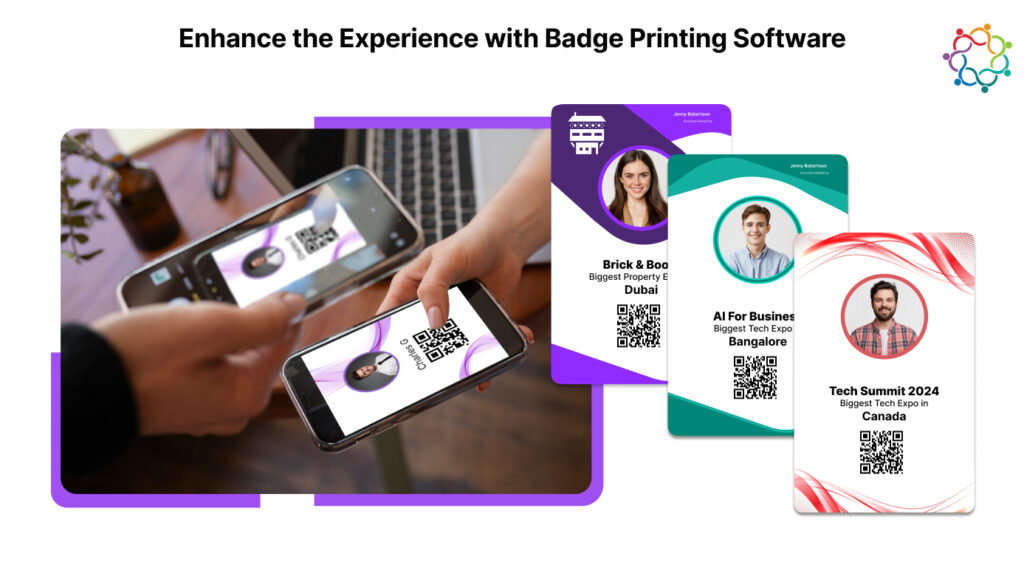
Samaaro takes the event experience a step further with its seamless badge printing functionality. It enhances the QR codes and offers benefits for attendee engagement and practicality:
i) Professionalism:
High-quality, custom badges create a polished and professional first impression. They add a touch of personalization and contribute to a memorable event experience. Moreover, it demonstrates your commitment to quality and ensures the attendees remember your event long after it concludes.
ii) Engagement:
Integrate QR codes directly with the event badges. This allows the attendees to easily access additional event information, download agendas, and connect with other participants via the networking features within Samaaro’s event management platform. In turn, it promotes engagement and keeps the attendees informed throughout the event.
iii) Networking:
Event badges can be transformed into more than just identification; they can act as access cards for specific areas like VIP lounges or workshops. Further, it enhances and facilitates networking opportunities with the other attendees.
iv) Lead Generation:
The sponsors and exhibitors can simply scan the attendees’ QR code to schedule a follow-up meeting for a more focused discussion. They can prioritize and nurture the high-quality leads and convert them into paying customers.
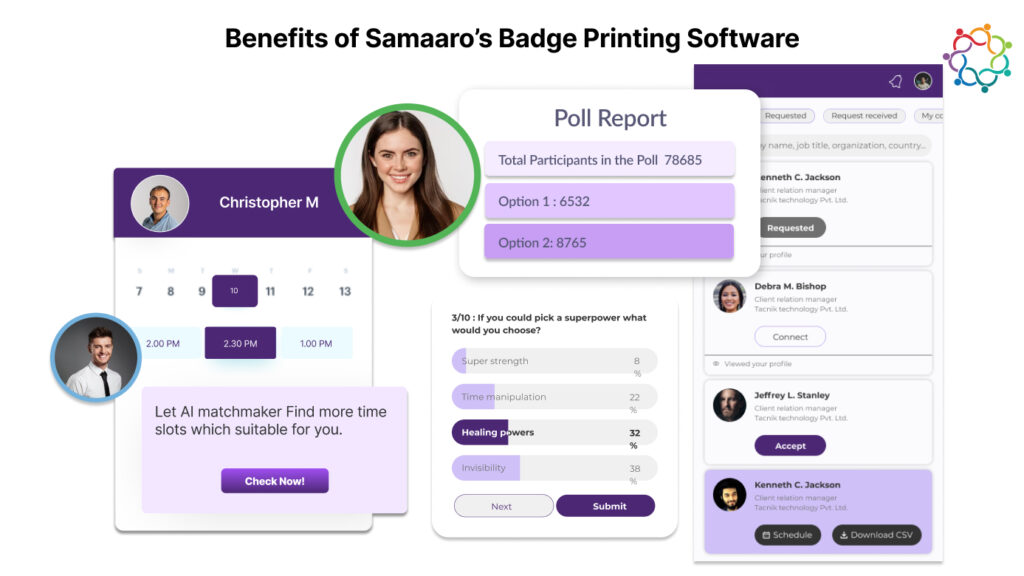
Picture gaining insights into the attendee movement and engagement – all through a scan of a QR code. This data empowers you to optimize future events and personalize the attendee experience, from the first check-in to the final session. By implementing Samaaro’s QR code and badge printing solution, you reap a multitude of benefits:
A. Attendance & Activity Tracking
Attendees can simply scan their unique code for effortless check-in, while you gain real-time data on their movement across different zones. Track attendee arrivals as they happen. Samaaro’s dashboard provides live monitoring and provides valuable insights into the overall event flow.
B. Lead generation
The QR codes on exhibitor booths empower the attendees to easily connect and share their contact information. This data helps exhibitors refine their approach and optimize their lead generation efforts.
C. Faster networking
Badges with QR codes act as digital business cards. The attendees can scan each other’s codes to instantly exchange contact information and search for each other based on shared interests. This facilitates more focused networking connections.
Samaaro’s innovative combination of QR code technology and badge printing offers a modern and efficient solution for event check-in. With personalized experiences and valuable data capture, Samaaro’s badge printing software empowers you to elevate your events and create a lasting positive impression. Start a free trial today to see how Samaaro can create a memorable event experience.
A successful event depends on a smooth registration and ticketing process; imagine long lines, frustrated attendees, and limited knowledge regarding who is coming. We are not suggesting that people don’t gain value from traditional registration methods; however, the way you handle registration is often the first impression attendees will have of your event and negatively affects their experience from the start. Our event registration software from Samaaro, luckily, provides an opportunity to make registration and ticketing a seamless experience for both the organizer and attendees.
When considering traditional event registration and ticketing, frustration is almost always a term tied to attendee experience: traditional methods often consist of delays and limited options that impede the ability for an efficient and engaging start to your event. Traditional methods often come with several pain points for your attendees:
Time Delay
Having to wait in a long line, or fill out a long form, can be tiring and deter your attendees from participating in your event.
Limited Ticketing Options
The only ticket provisions that are made to you, are the basic ones, meaning limited options for participants looking for other packages or experiences.
Limited Data Capture
Compared to your manual registration process, the manual registration process enables you to only capture data from time consuming methods which restrict us communicating uniquely or market to their individualized need.
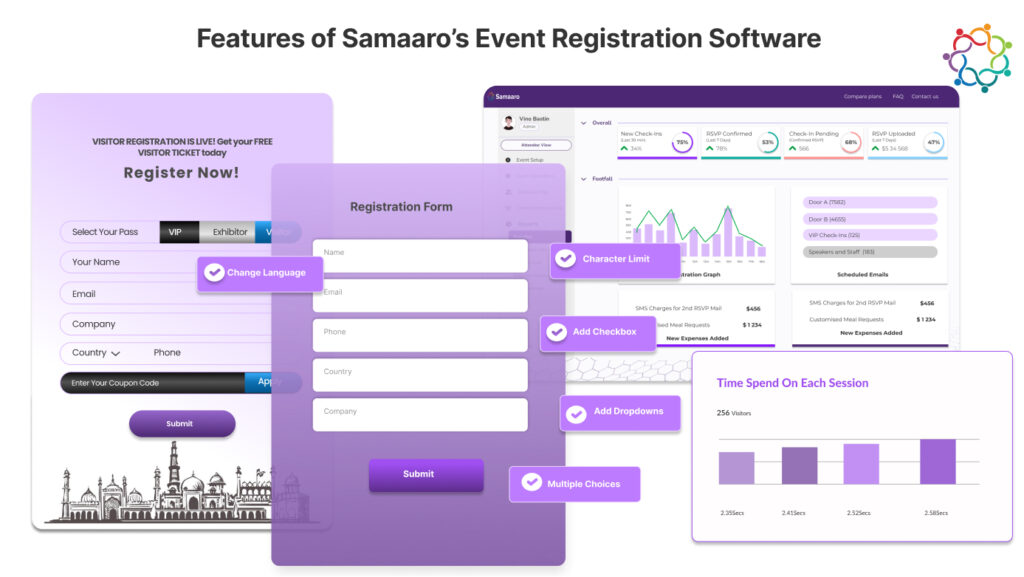
Event registration software that has streamlined features can create a smoother form Let’s take a closer look at Samaaro’s features and how they can help transform your event registration process:
Many Ticket Types:
You can offer multiple ticket types to meet the needs of your attendees. Early bird, VIP, workshops added, and tiered pricing options offer a professional manner for attendees to choose the ticket types they need.
Custom Registration forms:
You can create custom registration forms that obtain the important information you want to know about your attendees. For example, you can use the registration forms to obtain dietary information or determine what agenda or session attendees want options or obtain information about specific interests or expertise. This will improve your planning and give you a better way to engage and communicate with your attendees.
Back-end Registrations:
You can help groups or corporate registration with back-end registrations. You have the option of bulk registration through dedicated portals, which can help save an endless amount of time for attendees and the organizers. Plus, it can improve an efficient registration experience for conferences with hundreds or thousands of registrations and removes the repetition of individual registrations.
Financial Dashboard:
This function can help you track your event, ticket sales, and revenue as it is occurring. In addition, Samaaro’s financial dashboard simplifies and enables real-time insights on your events revenue and statistics related to registration. Therefore, you can adjust decisions on the fly, such as adjusting your marketing to fill more seats, or changing ticket pricing based on real-time revenue data.
Real-time Reports:
You can also use Samaaro to provide real-time reports on your event. After you register your attendees, you can examine the registration data by ticket type, referral source or demographics, to look for patterns to help guide you in making decisions. You’ll find out what marketing campaign provides the most registrations, what ticket types are of most interest, etc.
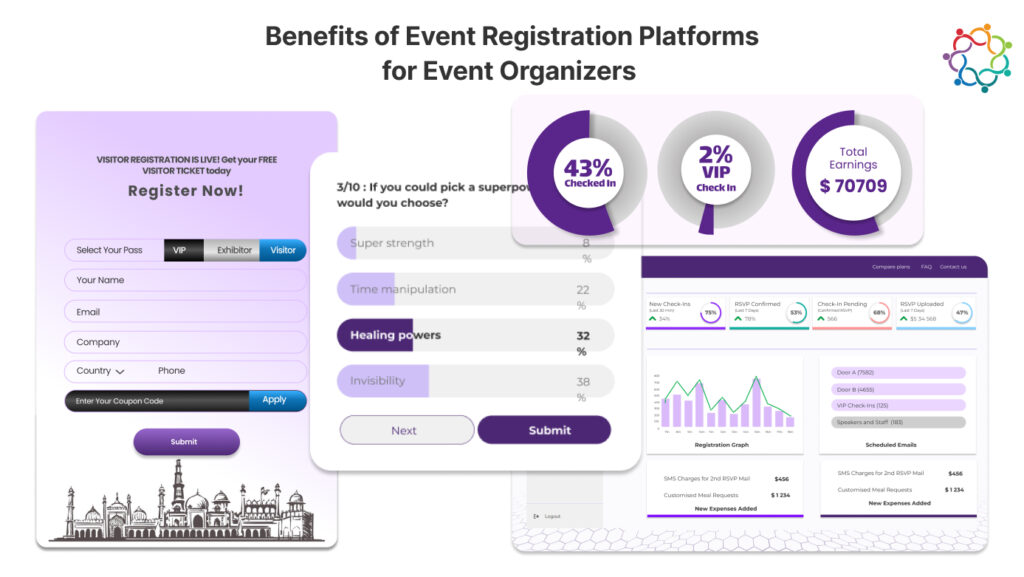
Event registration platforms provide event organizers with advantages from the income potential for tickets and vendors, to customer engagement within the event – that have the potential to elevate your event from bottom to top. Here are some of those advantages:
Save time and resource potential:
An event registration form Build can help you reduce manual entry data and streamline registration workflows. You will have more resources available for other areas of the event – content consolidation, or event logistics management.
Increase income potential:
Providing various kinds of tickets might support a larger audience with the opportunity for more revenue. Early bird discount, tier pricing, premium packages are all means to promote attendance and revenue.
Improve audience engagement:
Samaaro’s registration software allows you to gather audience information and provide communication, program content by interests, and increase engagement. Even sending an email before the event with relevant sessions, or a targeted post event survey can draw close connectivity to attendees.
Increase lead generation:
You can use the data collected to turn into qualified leads for future events or media campaigns. As you learn more about each audience, you can campaign to the right audience and bring them to your next events.
Samaaro’s event registration software is more than just gathering registrations and tickets, it helps with the entire process supporting organizers and clients, by allowing for a streamlined process, positive attendee experience, and information to help facilitate a successful event. If you are ready to change the registration and ticketing experience for your next event to the betterment of your bottom line, then sign up for a free trial on Samaaro to see how the platform, which your users will find easy, can change the wheels of your event.
Struggling to build anticipation for your next event? Spark excitement with personalized content previews and exclusive speaker insights from Samaaro’s corporate event management software. It includes powerful tools for boosting attendee engagement, streamlining communication, and building enthusiasm for your event. Attendees can easily access details about schedules, speakers, venue logistics, and FAQs, eliminating the need for multiple emails or phone calls. The following section of the blog explores specific features that have helped event organizers create successful curated events.
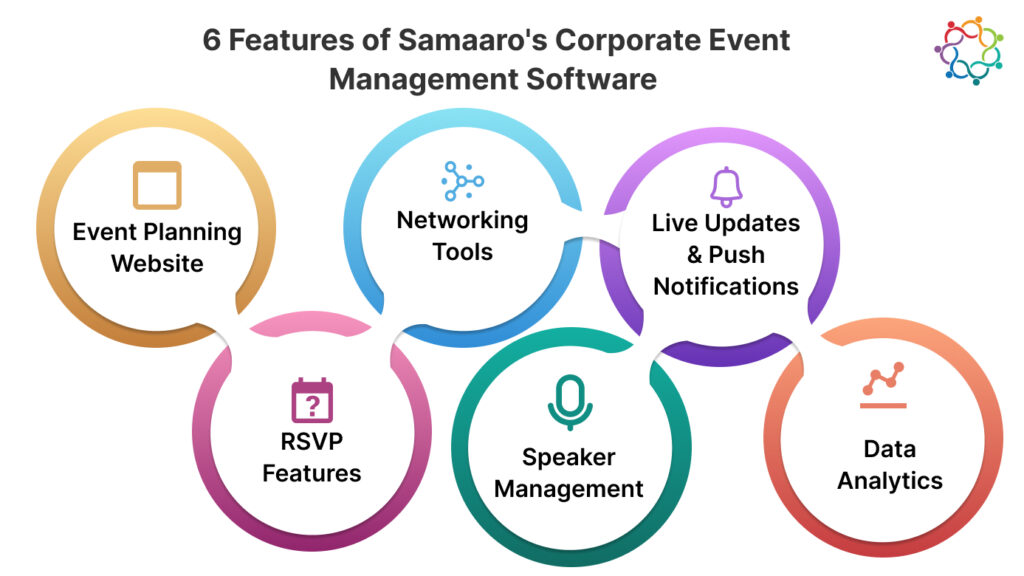
Samaaro’s corporate event management software empowers you to craft a captivating online experience that fuels excitement, personalizes the attendee journey, and sets the stage for exceptional networking opportunities. Here are Samaaro’s features that elevate the experience for all kinds of events:
1. Event Planning Website:
Samaaro’s event management tools provide guests with exclusive access to content that builds excitement for the event. It could include “behind the scenes” content, offering a glimpse into the event’s planning process. You can display event-related information like agenda, speakers, sponsors, and past event pictures on the website .
2. RSVP Features:
Our easy RSVP options with customized information-capture tools allow for a smoother event planning process and ensure the event caters to the specific needs of your exclusive attendee list. Guests can easily confirm their attendance, dietary restrictions, or indicate their preferred session choices directly through the platform. This simplifies event planning and logistics while tailoring the attendees’ experience.
3. Attendee App:
Samaaro’s attendee app goes beyond simple registration by empowering the attendees to actively shape their conference experience. They can personalize their schedules by adding and removing sessions or bookmarking speakers they’re interested in. The app also provides access to valuable resources, such as downloadable presentations, speaker bios, and exhibitor information, all in one convenient location. Additionally, it facilitates networking by allowing the attendees to connect with fellow participants based on shared interests or session preferences.
4. Networking Tools:
Our matchmaking algorithm uses the attendees’ profiles to recommend potential connections based on shared interests, promoting targeted networking even before the event begins. Samaaro provides a secure direct messaging platform that allows attendees to connect and schedule meetings with each other throughout the event. For a more structured approach, the event management platform allows you to set up one-on-one meetings or small group discussions. This can be particularly valuable for connecting attendees with specific speakers or industry leaders they’re eager to meet.
5. Speaker Management:
Samaaro’s event management platform helps you centralize and manage speaker profiles, tasks, and travel logistics in one place. It provides speakers with easy access to upload important documents like bios, headshots, abstracts, presentation materials, and their travel plans. The centralized platform is a dedicated point of contact that lets you send clear, timely, and automated updates, keeping speakers informed and engaged.
6. Live Updates & Push Notifications:
Instantly notify attendees of any last-minute changes to the schedule, room locations, or speaker substitutions to eliminate confusion. Leverage the push notifications on Samaaro’s mobile event management app to send timely reminders about upcoming sessions, so they don’t miss out on valuable content. You can even broadcast important announcements like special event features directly to attendees’ phones to keep them engaged. Ultimately, real-time information empowers attendees to navigate the event with ease, be updated on important announcements, and stay actively involved throughout the event.
7. Data Analytics:
Collect data from various stages of the event lifecycle using Samaaro’s event management tools. Track registration and feedback trends to understand attendee demographics like location, industry, and job title. Further, analyze the session attendance, website traffic within the event app, and participation in polls or Q&A sessions. Finally, capture the attendees’ sentiment through post-event surveys or feedback forms within the mobile event management app.
8. Integrations:
Samaaro’s platform integrates with leading CRMs, marketing automation tools, and even WhatsApp for a seamless flow of information. Nurture leads even before the event by automatically sending targeted pre-event emails based on their interests, quick updates, reminders, or post-event surveys, keeping the attendees informed and engaged throughout the journey. The integration capabilities empower you to automate communication tasks, free up valuable time, and ensure consistent, personalized communication with your stakeholders.
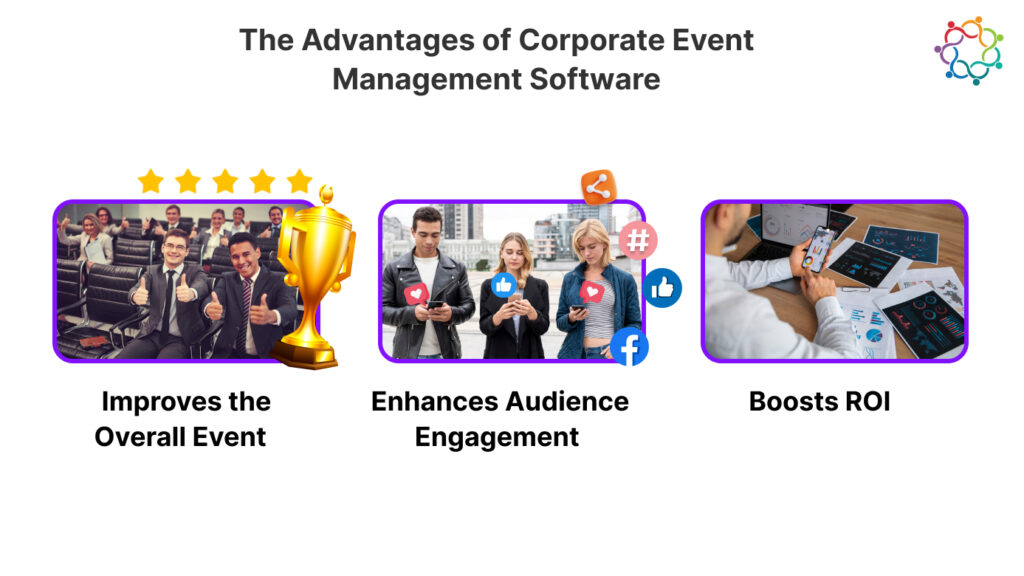
From automating tedious tasks to gleaning valuable insights, event management software can transform your event. Here’s how:
Uncovering valuable information about your attendees helps you understand their interests, preferences, and areas of knowledge gaps. This allows you to tailor future events that better resonate with your target audience. Plus, analyzing negative feedback and data such as low session attendance helps identify areas for improvement in future events.
By addressing attendee concerns and feedback, you can tailor content to be more engaging and address the specific challenges faced by participants. Actively incorporating feedback demonstrates that you value attendee input. This fosters trust, credibility, and a sense of community, encouraging participants to actively engage in future events.
Data analytics helps measure the effectiveness of your content strategy and make data-driven decisions. Moreover, it lets you track costs associated with the event alongside key metrics like session attendance and attendee satisfaction to improve future events and maximize the return on investment.
Event management shouldn’t be a headache, no matter the scale. Let Samaaro’s corporate event management software take the effort out of planning and elevate your next event! Start your free trial and create remarkable event experiences.
A website is a potential attendee’s first impression of your event. That’s why Samaaro’s event planning website empowers you to create stunning branded websites that perfectly encapsulate your event’s essence. These websites are customizable designed to resonate with your target audience, no matter the event type. Read on to know how they benefit different event types and create a foundation for a truly successful experience.
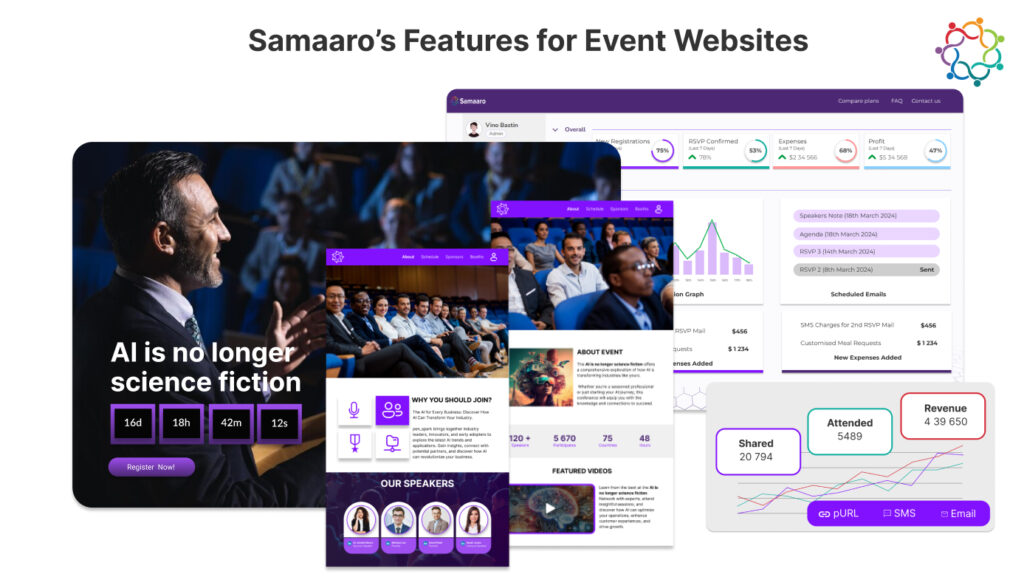
Craft a seamless and engaging online experience for your attendees. From captivating design elements to data-driven functionalities, discover how Samaaro empowers you to create an event website that not only informs but also excites and drives registrations. Dive deeper into the features offered by Samaaro’s event software:
Ditch the cookie-cutter look and leverage Samaaro’s event software for branded themes. These customizable themes allow you to seamlessly integrate your brand’s colors, fonts, and logos into the event website, creating a cohesive and professional experience for attendees.
Samaaro’s event management platform doesn’t just handle registration – it empowers attendees with a comprehensive and informative website. The website becomes a central hub packed with detailed event schedules, venue location, speaker bios, and downloadable resources.
Take your event beyond physical borders with SEO optimization tools built into Samaaro’s website builder. Optimize the website content with relevant keywords, ensuring your event reaches a wider audience and attracts a pool of qualified participants. Further, let your event appear at the top of search engine results when potential attendees look for events in your niche.
Samaaro’s referral tracking capabilities enables you to identify the exact source – a social media post, a partner website, or an industry publication – that led attendees to register for your event. This valuable data empowers you to understand which marketing channels are most effective in reaching your target audience.
Apart from providing aesthetics and functionality, Samaaro’s event software seamlessly integrates with popular analytics tools like Google Analytics and Meta Pixel. It lets you gain valuable insights into the attendees’ behavior on your event website. Moreover, it enables you to track the website traffic, analyze user journeys, and understand which marketing channels are driving the most registrations.
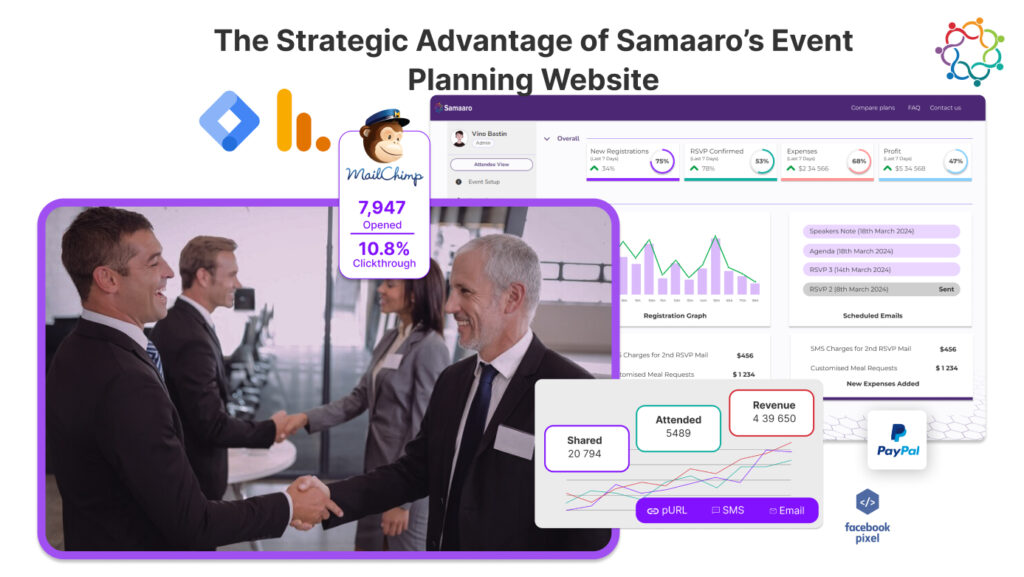
In today’s competitive event landscape, a strong online presence is no longer a luxury, it’s a necessity. Read on to know what truly sets Samaaro’s event management platform apart:
An exhaustive website allows attendees to plan their experience in advance, identify sessions that resonate with their interests, and feel confident and prepared when they arrive. Samaaro’s event planning tools create a sense of transparency and builds trust with the attendees, ultimately leading to a more engaged and enjoyable event experience for everyone.
A website that reflects your brand’s unique personality promotes instant recognition and builds trust with participants. This level of customization goes beyond aesthetics – it strengthens brand recall and positions your event as a premium experience, setting the stage for a memorable and impactful event.
A well-optimized website with relevant keywords will rank higher in search engine results pages. This ensures that potential attendees searching for events in your niche are more likely to find yours, increasing your event’s online visibility significantly.
Analyzing UTM data lets you optimize your marketing strategies, allocate resources more effectively, and target the right audience with the right message. This not only boosts registrations for future events but also allows you to build stronger relationships with referral partners who are driving qualified leads your way.
Integrations with analytics tools provide valuable insights into attendee behavior on your event website. This knowledge empowers you to optimize your website for better conversions, tailor future marketing campaigns for maximum impact, and ensure your events reach the right audience at the right time.
Samaaro’s event planning website is an extension of your brand. By harnessing the power of branding themes, informative content, and seamless integrations, you can cultivate a cohesive online experience that resonates with attendees and sets the stage for a successful event. Start your free trial and organize flawless events.
A positive event experience hinges on a seemingly small detail, seamless yet secure access control. Imagine arriving at a conference, eager to learn and network, only to be met with long lines and tedious check-in procedures. This frustration can instantly dampen the mood. Conversely, a smooth and secure entry process sets the tone for a positive experience. Secure access control using an event management system offers several features to smoothen entry, eliminate congestion, and enhance security.
This blog dives deeper into the limitations of traditional access management and explores how innovative solutions like Samaaro’s software for event management can revolutionize the way attendees experience your event.
The smooth entry process taken for granted at events can be a nightmare if you rely on traditional access management methods for the various reasons mentioned below:
Verifying access levels and privileges for a large crowd leads to bottlenecks at entry points. These obstacles can create a frustrating experience for attendees and delay the event.
Checking-in attendees manually provides minimal data on attendee arrival times. Tracking the movement of a large guest list with VIP tiers can become challenging. Take for example color coded badges. While they are quick and efficient, you lose valuable data insights.
Manual check-in processes often overlook a valuable opportunity- capturing rich attendee data and generating high-quality leads. This missed interaction hinders the ability to convert attendees into loyal customers.
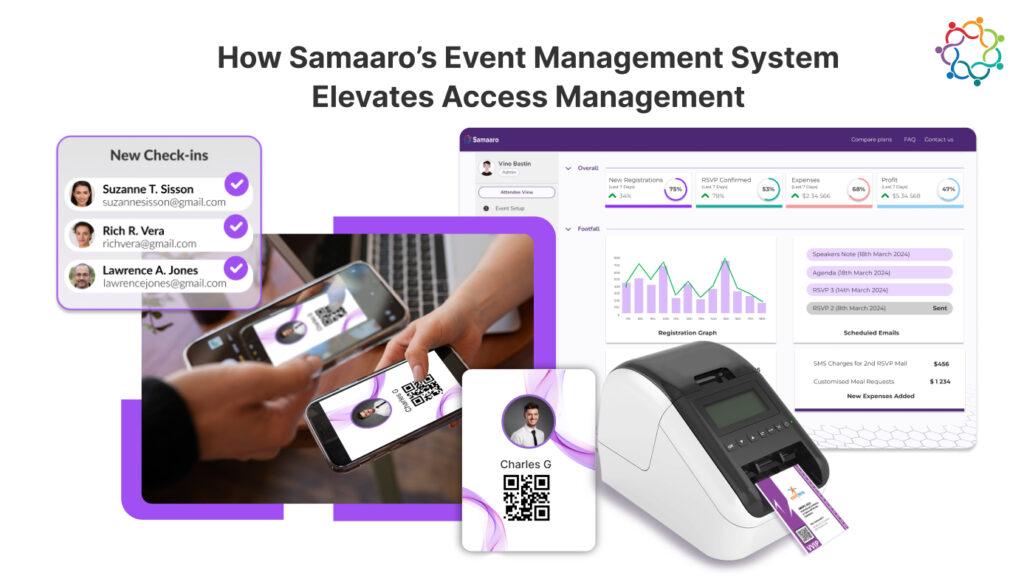
Samaaro’s software for event management leverages cutting-edge technology to streamline check-in, enhance security, and empower you to manage your guest lists with remarkable efficiency. Let’s explore how:
1. Secure Guest List Management
Samaaro’s event management tools let you take control of your event with granular access control features. It enables you to define specific access levels for different guest groups, restricting entry to designated areas, sessions, or networking opportunities based on their tier or role. The digital guest lists with access control are your security shield. They prevent unauthorized entry and ensure only approved individuals can access specific parts of the event, creating a safe and secure environment for everyone involved.
2. Streamlined Check-In Processes
QR code scanning at the event venue allows attendees to breeze through the entry process, maximizing their time at the event. This streamlined approach frees up staff resources previously dedicated to manual verification. The staff can now focus on welcoming attendees and addressing any last-minute concerns, creating a more positive arrival experience.
3. Real-Time Monitoring and Reporting
With insights into attendee arrival patterns and location data, you can adjust security personnel allocation to optimize crowd flow and prevent overcrowding in specific areas. Monitoring the successful check-ins and unauthorized access attempts can help you identify potential security breaches. It enables you to make proactive adjustments like deploying additional staff or opening alternative entry points. In the unfortunate case of an emergency, real-time data on the attendees’ location can help emergency responders locate them and efficiently coordinate evacuation efforts.
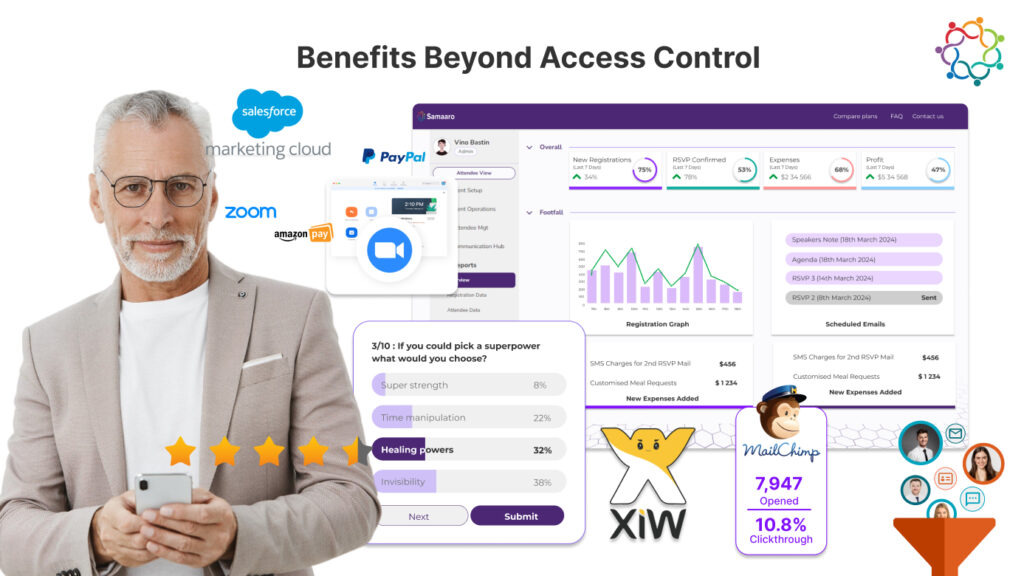
The true potential of Samaaro’s software for event management lies beyond the initial check-in. From improving attendee engagement and providing valuable data insights to nurturing potential leads, it can elevate your event into an experience that maximizes value for you and your guests. Read on to know more in detail:
Samaaro’s features like QR code scanning and contactless verification ensures attendees can move freely between different areas without encountering frustrating congestion. Faster entry times and smoother access to different locations contribute to a more positive experience for attendees, increasing their satisfaction and the chances of attending your next event. The added benefit of providing a great experience is that it increases the likelihood of positive word-of-mouth marketing, attracting more attendees to future events.
Our event management tools track entry and exit times for various sessions, helping you identify the popular sessions and tailor future content calendars and speaker selections to match the audience’s interests. By understanding areas with high traffic or underutilized spaces, you can adjust booth placement, networking areas, or even refreshment stations to encourage more engagement throughout the event.
Access control data, combined with registration information, allows you to collect additional information beyond basic details. Samaaro’s integration with marketing automation tools lets you gather valuable data on the attendees’ interests, preferences, and lead potential. You can leverage this data for targeted post-event communication, sending personalized follow-up emails with relevant content based on their interests and session attendance. This targeted approach allows you to nurture high-quality leads and increase the chance of conversion.
Samaaro’s event management system allows you to gain increased control with secure guest lists, valuable data, and reporting capabilities to optimize future events, and ultimately, a more successful and secure event overall. Start your free trial and transform your event into a resounding success.
How do you know if your event is truly hitting the mark? Traditional methods often provide data after the event has concluded, limiting the ability to make adjustments or address attendee concerns on the fly. Samaaro’s software for event management empowers you to go beyond a simple “good job” by transforming attendee feedback into actionable strategies. This blog will delve into the challenges of traditional feedback methods and explore how Samaaro’s innovative tools can help you.
From understanding attendee expectations before the event begins to gauging real-time engagement during sessions and capturing comprehensive satisfaction after the dust settles, Samaaro utilizes a suite of tools to transform feedback into actionable insights. Here’s how these features work together to paint a complete picture of your audience’s experience:
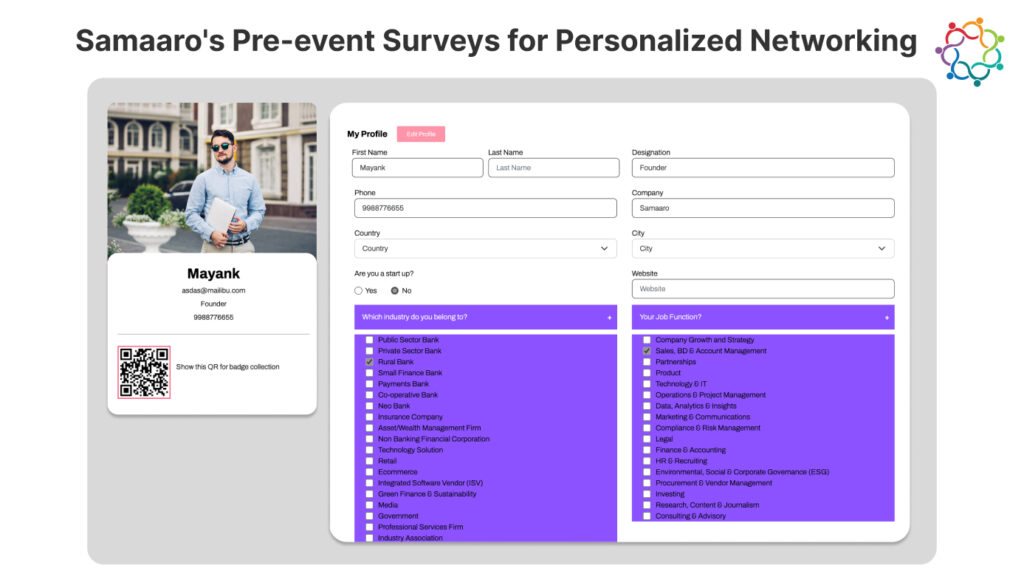
Samaaro’s event management application takes pre-event surveys beyond the ordinary and dives into what attendees hope to gain. The attendees can create their profile which includes information such as the industry they belong to, their job function, the sessions they want to attend, and other attendees they look forward to meeting. Further, segmenting the attendee list based on the survey results facilitates personalized communication. This means you can send targeted emails highlighting relevant sessions, speaker profiles, and networking opportunities that align with their specific interests.
Live polling with Samaaro isn’t just about gathering answers; it’s about sparking dialog. Use the poll results as a springboard for interactive discussions, encouraging attendee participation and deeper learning. Similarly, Samaaro’s Q&A feature centralizes questions and ensures no voice goes unheard. You can effectively moderate discussions, prioritize inquiries, and keep the flow engaging. And to create a truly inclusive environment, the anonymous option lowers inhibitions, encouraging everyone to participate.
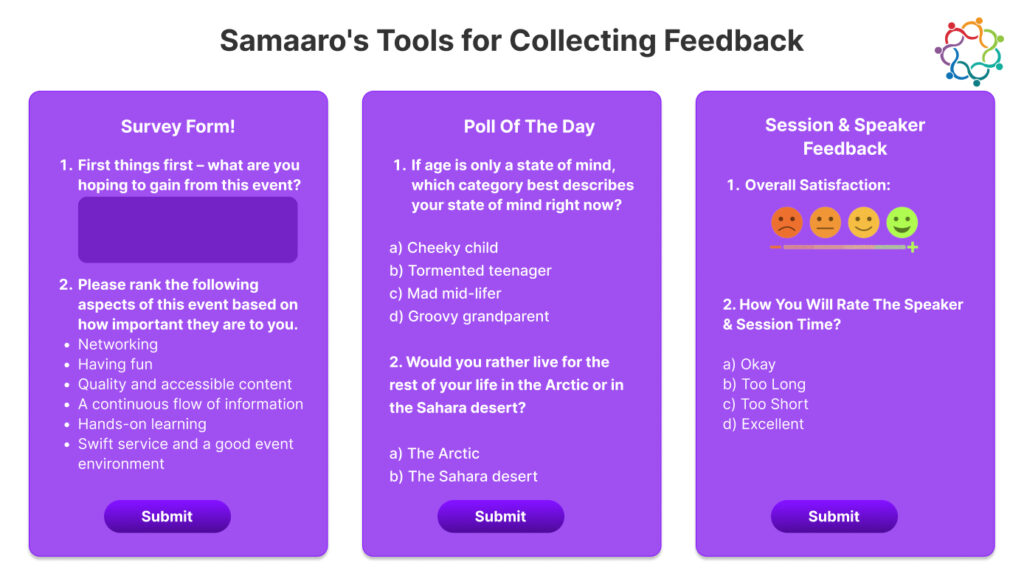
Allow the attendees to review the session and rate the speakers. Incorporate open-ended questions so attendees can share their specific insights, suggestions, or areas for improvement. Then, collect the ratings on the speaker’s expertise, session content, presentation style, and overall value delivered. The attendees’ feedback will help identify speakers who resonated with the audience and consider them for future events. Insights on the presentation style can also inform the speaker selection for upcoming sessions. At the same time, feedback on session content will help adapt future session topics, materials, and format. By incorporating this feedback into your event planning process, you can continually improve the attendee experience.
Our event management application allows attendees to rate the booths they visited in terms of the product or service displayed, the engagement levels of the booth staff, and the overall value received. Simultaneously, exhibitors can rate the quality of individual attendee meetings on their dedicated dashboard. The dashboard showcases additional insights like the number of attendees who visited them and the types of attendees they interacted with.
Samaaro’s corporate event management software empowers you to design surveys that dive deeper, focusing on specific areas you want to understand better. This could include session content, speaker effectiveness, networking opportunities, venue amenities, and overall event satisfaction. Powerful reporting and analytics tools transform responses into actionable insights, allowing you to visualize your feedback, identify trends, and pinpoint areas for improvement. Moreover, historical data from past events lets you continuously improve your event strategy, ensuring each iteration is more engaging and impactful than the last.
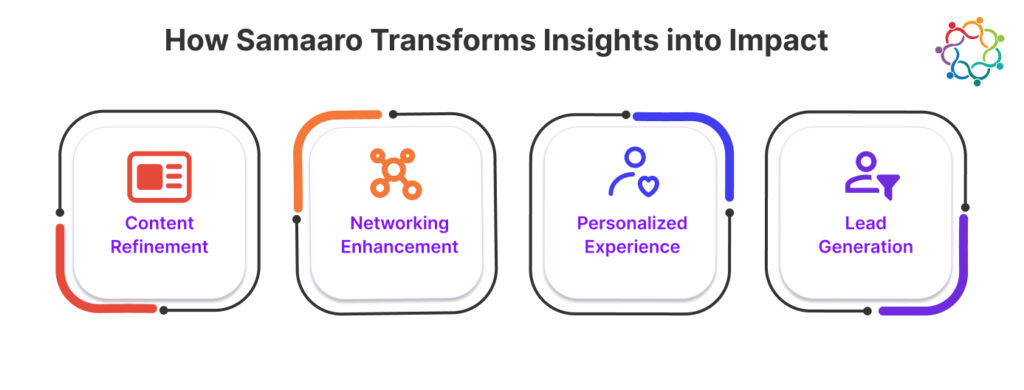
Samaaro doesn’t just collect feedback; it empowers you to use it strategically. Let’s explore how our event management application can transform your B2B events by prioritizing the attendee insights.
Based on the attendees’ feedback, develop new sessions that address knowledge gaps and cater to the audience’s interests. Consider incorporating more interactive formats like workshops or group discussions for specific topics. Also prioritize speakers who resonated with attendees for future events. And seek out those with specific delivery styles or expertise that align with your audience’s evolving preferences. By refining content based on attendee input, you can ensure each event surpasses the last, offering a more valuable and engaging experience for attendees year after year.
Pre-event surveys and post-event feedback can shed light on attendee preferences for networking formats. This data allows you to design a mix of networking activities catering to diverse preferences. At the same time, it enables you to identify the most optimal times for networking and schedule dedicated breaks. Samaaro’s corporate event management software can match attendees based on shared interests, professional backgrounds, or goals as specified in their profiles. By facilitating targeted connections, you increase the likelihood of attendees forming valuable relationships that can translate into leads or future business partnerships.
Feedback on session content and speaker effectiveness reveals attendees who were highly engaged and likely to be receptive to further communication. Similarly, active participation in live polls and Q&A sessions indicates deeper interest in the topic, making these attendees more likely to be qualified leads. By segmenting your attendee list based on post-event survey data, you can personalize follow-up emails with relevant content, resources, or invitations. This targeted approach demonstrates your understanding of individual attendee needs, promotes continued engagement, and effectively nurtures these leads through the sales funnel.
Insights on the quality of booths and the attendees’ experience with the exhibitors let you identify which booths received high ratings for the product usefulness or staff interaction. Use this insight to re-invite these exhibitors to future events. At the same time, learning how the exhibitors found the quality of their conversations with the attendees will help you identify high-potential leads for follow-up after the event.
Samaaro’s software for event management empowers you to truly understand your audience and surpass their expectations. Create events that spark engagement, forge lasting relationships, and convert attendees into qualified leads. Don’t just take our word for it. See the Samaaro difference in action! Start your free trial today and discover how to transform feedback into impactful events.
Exclusive events require meticulous planning and execution to ensure a flawless experience that exceeds expectations. But managing RSVPs, VIP requests, and personalized interactions for a select few can quickly become challenging. Especially because manual tasks eat up valuable time, and the risk of errors grows with each added guest.
Here’s where the magic of automated workflows steps in. By embracing Samaaro’s event planning software with automation features, you can streamline your workflow, elevate the attendee experience, and ensure your exclusive event remains just that – exclusive, flawless, and a resounding success.
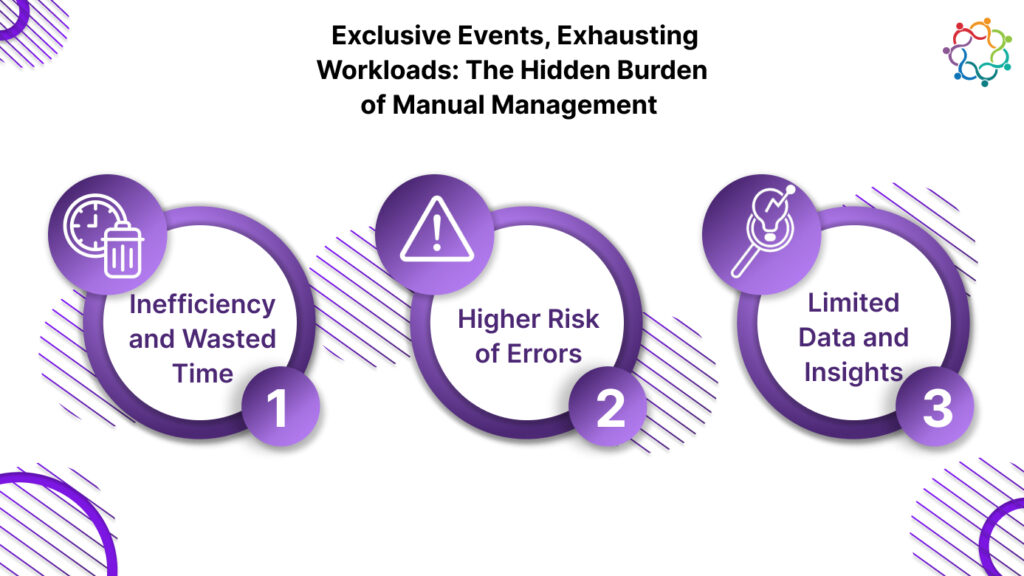
While the focus at exclusive events is on creating a seamless experience for high-profile attendees, the burden of manual management often goes unnoticed. From meticulously tracking RSVPs to verifying credentials, countless manual tasks can quickly consume valuable time and resources. Let’s delve deeper into the complexities of manual management:
Managing RSVPs, communication, and guest verification manually generates a significant workload. It leaves you with less time to focus on creating a seamless and memorable event experience.
Manual tasks are prone to human error. Mistakes in RSVP tracking, communication breakdowns, or discrepancies at the door can lead to frustrated guests, security breaches, and a negative event perception.
Without an automated system for feedback collection and analytics, valuable data on guest behavior and preferences is lost. This limits your ability to understand the guests’ experiences, identify areas for improvement, and tailor future closed-door events.
Automated workflows within Samaaro’s event management platform streamline communication, personalize interactions, and simplify post-event follow-up for exclusive groups. Here’s a detailed explanation of the benefits:
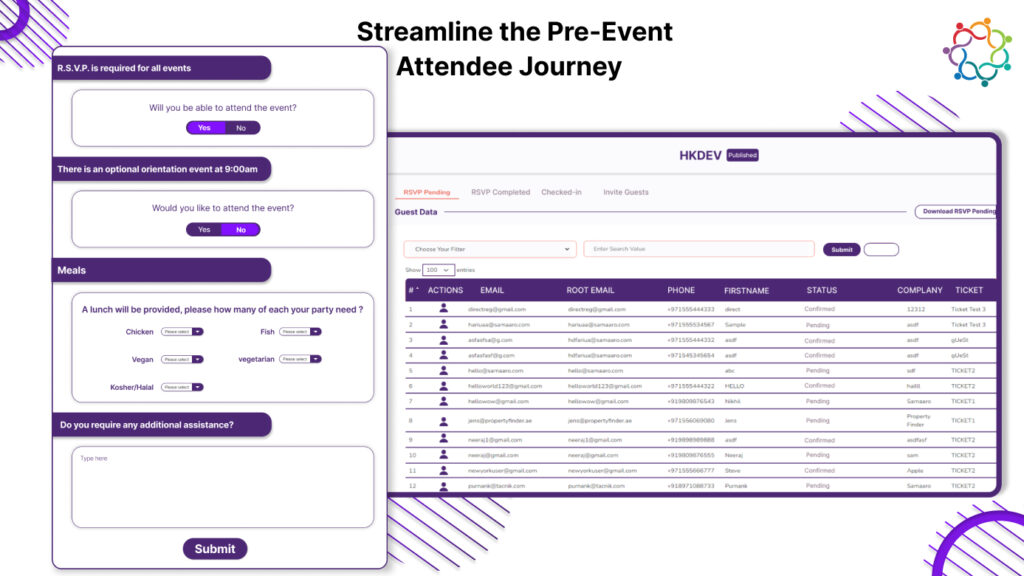
Samaaro’s priority is to increase the efficiency and ensure no time is spent on repetitive tasks. Our automated workflows send personalized invitations with clear RSVP options where attendees can confirm their attendance and their preferences. Once an RSVP is received, the system automatically generates confirmation emails. These include important details like event schedules, venue information, and access instructions, all tailored to the specific attendee. Integration of the RSVP system with Samaaro’s check-in & badge printing software generates the QR codes automatically for each attendee.
Pre-event communication ensures attendees arrive prepared and informed, leading to a more fulfilling experience. It promotes a sense of anticipation for the event and ensures attendees are excited to participate in the sessions most relevant to them. But, most importantly, it eliminates inefficiency and wasted time.
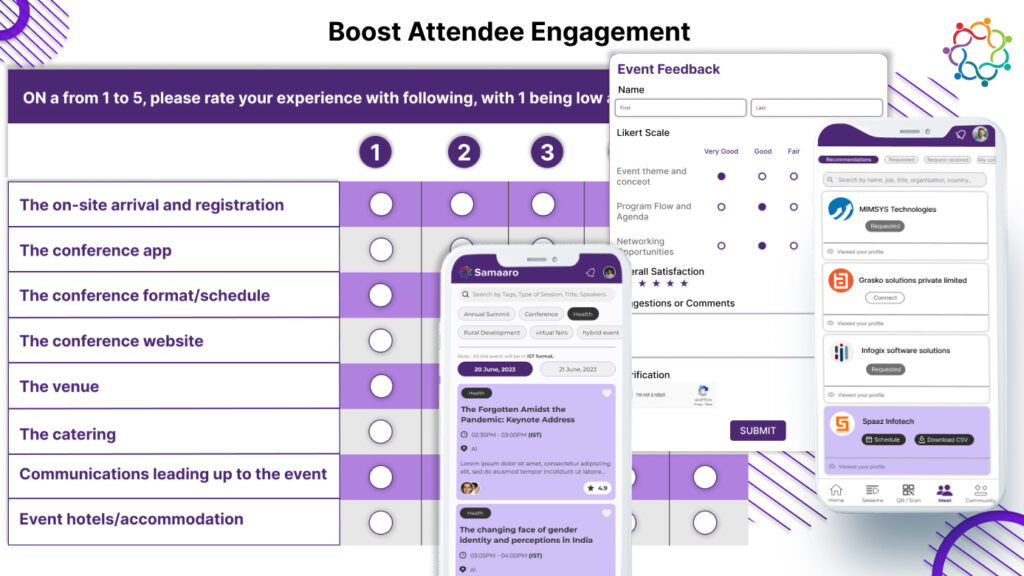
Based on their profiles, industry, and interests, the attendees can receive personalized session recommendations that align with their specific goals. Samaaro’s event management software also suggests relevant content based on the attendee preferences gleaned from RSVP forms or past interactions. The automated system can analyze attendee profiles and identify potential networking matches. Moreover, in-app surveys and feedback gather valuable insights on attendee satisfaction, session feedback, or networking experiences.
Personalized and automated recommendations ensure attendees engage with topics that resonate with them, maximizing their learning and networking potential. The data collected from the feedback empowers you to identify areas for improvement and tailor future events to better meet the attendee needs.
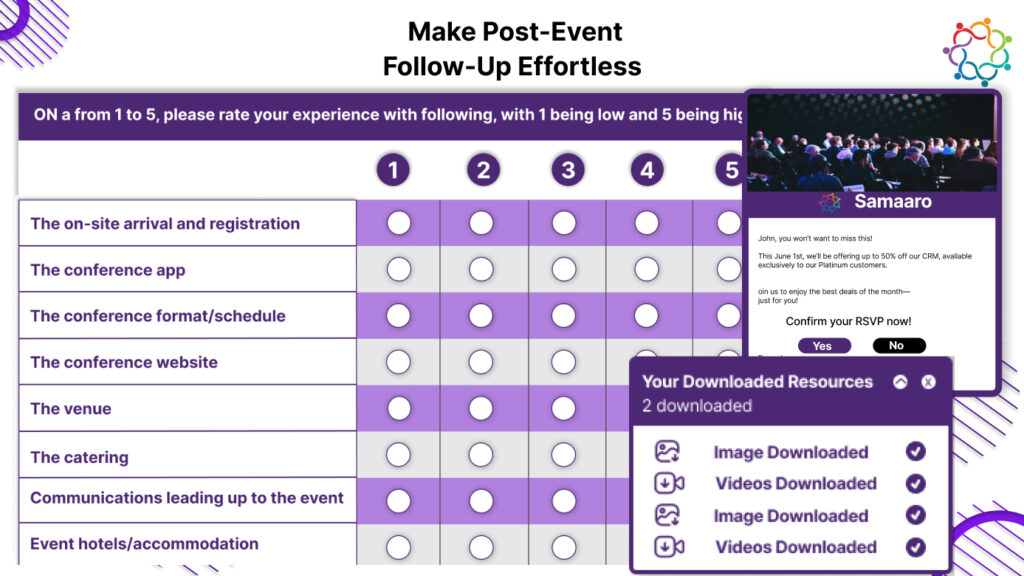
Samaaro’s event management platform automates the distribution of post-event surveys. It also lets you share valuable resources like presentations, documents, or additional materials with attendees after the event. The automated workflows can trigger emails with download links and grant access to a dedicated resource library within the event app.
It is paramount to continue the conversation beyond the event with relevant content, industry updates, and exclusive offers. That’s because regular communication keeps your brand top-of-mind, promoting a sense of loyalty and encouraging repeat attendance at future events.
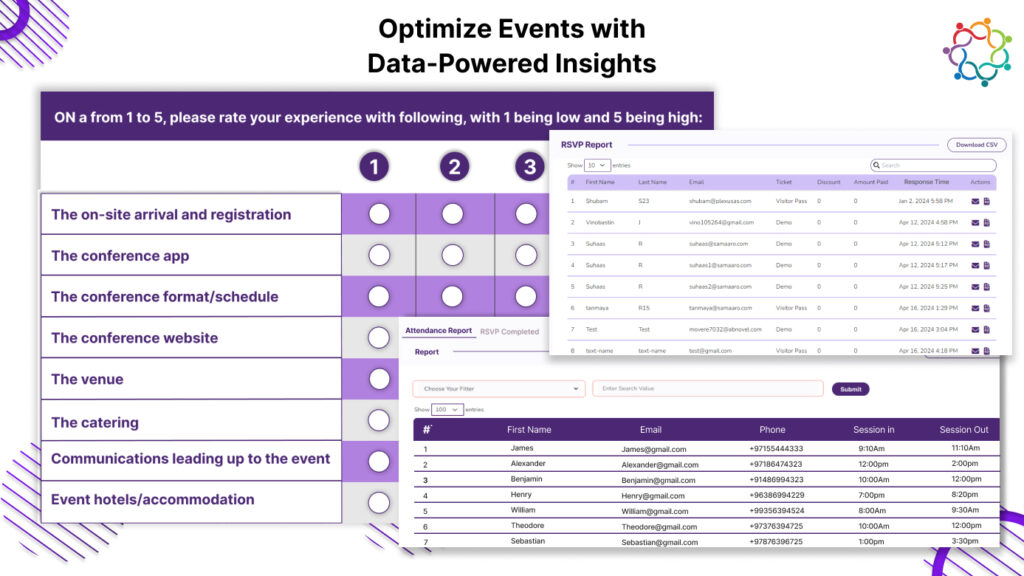
Samaaro’s automated workflows ensure that valuable data on guest behavior and preferences is not lost. They generate reports revealing trends like RSVP response times. They also provide a clear picture of your audience demographics including details like age groups, job titles, company sizes, or geographic locations. In addition, they track session attendance, analyze in-app activity during presentations, and capture data from post-session surveys.
Insights into the attendee demographics empower you to optimize content to resonate with your target audience, ensuring a well-rounded event experience. More importantly, insights into the peak response times and other key metrics let you measure the ROI of your event, tailor future pricing strategies, and optimize marketing campaigns for better reach.
Stop sifting through endless spreadsheets! Automate tasks, leverage data for personalization, and streamline your workflow! By eliminating the repetitive tasks that bog down event management, Samaaro’s event planning software empowers you to ensure a flawless guest experience that exceeds expectations. Start your free trial and elevate your events to a whole new level of sophistication.
In the high-octane world of B2B events, sponsorship management can feel anything but streamlined. But what if there was a way to transform it from a burden into a strategic advantage? In this blog post, we’ll delve into the specific challenges of event sponsorships and explore how Samaaro’s features address these concerns.
The B2B industry thrives on innovation, and event sponsorship is no exception. However, securing and managing sponsors for events presents a unique set of challenges like the ones mentioned below:
Corresponding with a large number of sponsors, educating, and following up with on-going documents like contracts, approvals, and legal agreements, can lead to disorganization and possibly even lost information quite quickly. Given that there may be multiple rounds of edits and updates to sponsor materials, making sure that everyone is on the same version of the material can be a challenge which could lead to confusion and inconsistency in branding.
B2B events attract a diverse range of sponsors – from established giants to agile startups with distinct goals. Some sponsors might prioritize brand awareness, while others seek lead generation, product promotion, or talent acquisition. A one-size-fits-all sponsorship package won’t effectively cater to these diverse needs.
Event sponsors are particularly focused on measurable results and ROI. They require concrete evidence that your event will deliver value and help them achieve their marketing goals. You need to provide data and analytics to demonstrate the value of sponsorship opportunities.
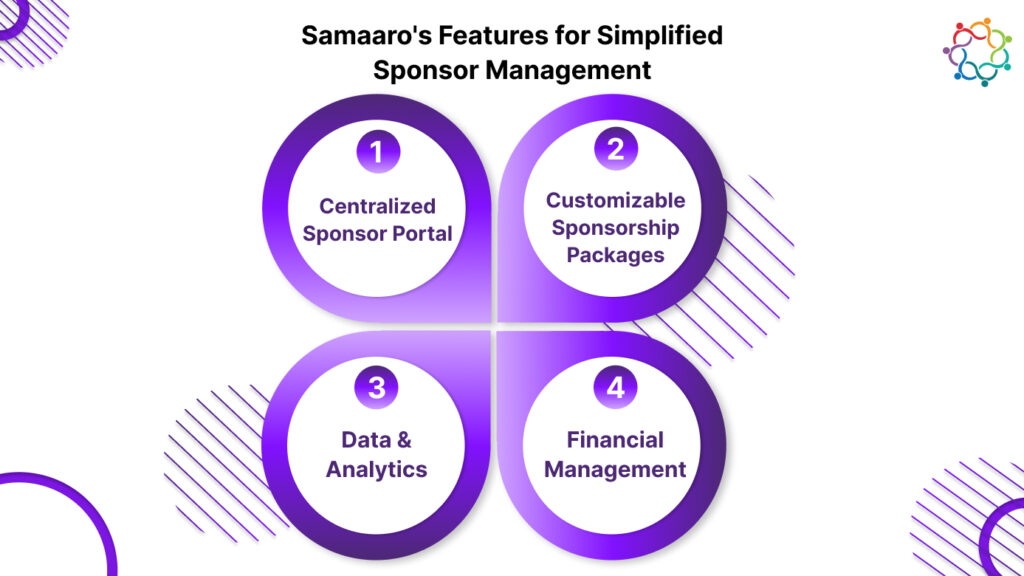
Simplified sponsor management takes the complexity out of sponsor partnerships. It enables you to streamline communication, cater to diverse sponsor needs, and ensure everyone’s on the same page. Here’s a breakdown of Samaaro’s features:
The portal allows sponsors to view important information regarding the event including the schedule. Document uploads are simple; sponsor agreements, insurance, tax forms, and marketing materials for their booth or sponsored sessions can all be uploaded. This way sponsors can ensure compliance with the event branding guidelines and ensure they do not conflict with other sponsor materials.
By building tiered packages with varying benefits and pricing structures, you can offer options that align with different sponsor needs and investment levels. This flexibility allows you to cater to a wider range of sponsors, from established brands with significant budgets to smaller companies seeking targeted exposure.
Sponsors can receive real-time access to key metrics such as the number of impressions their logo receives, or website traffic driven from their event participation. Lead generation becomes more measurable with insights into the number of leads captured through their booth or sponsored sessions.
Samaaro’s sponsor management software streamlines the financial side of event sponsorships. We offer financial management tools to track sponsor payments, generate invoices, and manage billing cycles.
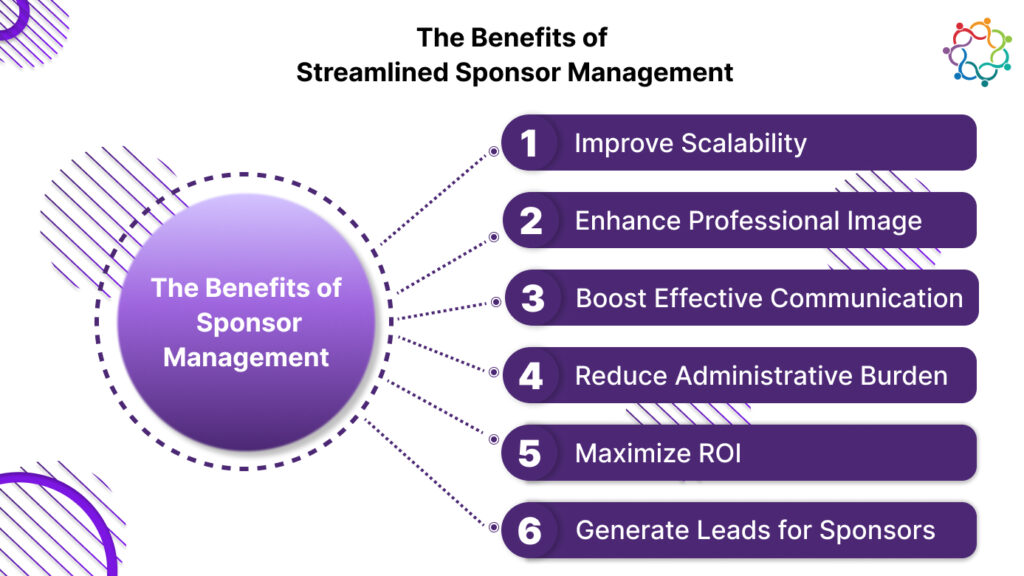
Streamlined sponsor management boosts scalability to handle sponsor growth, enhances your professional image with a polished platform, and streamlines communication for crystal-clear transparency. Let’s delve deeper into how streamlined sponsor management translates to success for event organizers:
Efficient systems for managing sponsors enable you to manage a higher volume of sponsors more effectively so that you can scale up your events. This could include automated email sequences to keep your sponsors updated on deadline reminders, personalized deadlines for key milestones, or sending invoices automatically to handle your financial process seamlessly. This then allows you to focus on what matters most – growing sponsor relationships, building out new deals, and crafting even better sponsorship opportunities.
Samaaro’s dedicated sponsor management system streamlines the onboarding process for sponsors. It also provides sponsors with clear access to essential information, deadlines, and branding guidelines. This attention to detail showcases your professionalism and sets the stage for a smooth and positive long-term partnership.
Disclose contracts, sponsorship details, and invoices in the sponsor management system to enable clear communication and easy access to important information. Transparency helps establish trust and shows your commitment to a fair and open partnership. Sharing live data and analytics on brand exposure also reflects your commitment to ROI and shows you are a data-driven organizer focused on delivering value.
Automated workflows for key processes like generating reminders for logo submissions and registration deadlines allow you to focus on more strategic aspects of sponsor management. At the same time, providing a centralized hub for all sponsor-related information eliminates the need to chase down information. Plus, it significantly reduces the administrative burden associated with managing multiple sponsors and their agreements.
By leveraging features like automated communication and data-driven insights, you can attract and retain high-value sponsors. This translates to increased sponsorship revenue, but the benefits go beyond just the initial investment. Strong sponsor relationships can lead to valuable partnerships that open doors to future collaborations or even co-marketing initiatives. Additionally, satisfied sponsors are more likely to renew their partnerships or even increase their investment in future events, creating a sustainable revenue stream and fueling your event’s long-term success.
The sponsorship management system can integrate with Samaaro’s registration software, allowing the sponsors to scan the QR codes of attendees. This allows them to focus on the most promising leads and prioritize their follow-up efforts.
Moreover, sponsors can create engaging online profiles within the event platform. These profiles allow attendees to easily learn about the sponsor’s company and products through detailed descriptions, brochures, or media presentations. They also let attendees schedule meetings or request consultations directly within the platform, promoting valuable networking opportunities. Additionally, sponsors can send targeted messages or promotions to attendees who scanned their QR codes or visited their online profiles through the platform. This personalized approach can further engage attendees and increase the sponsor’s return on investment.
Enable your sponsors to succeed! Samaaro’s platform gives your sponsors access to the tools they need to measure their success and ROI, while providing you with a managed and scalable system for sponsor management to easily facilitate your event. Begin your free trial and accelerate your event with managed sponsorship systems!
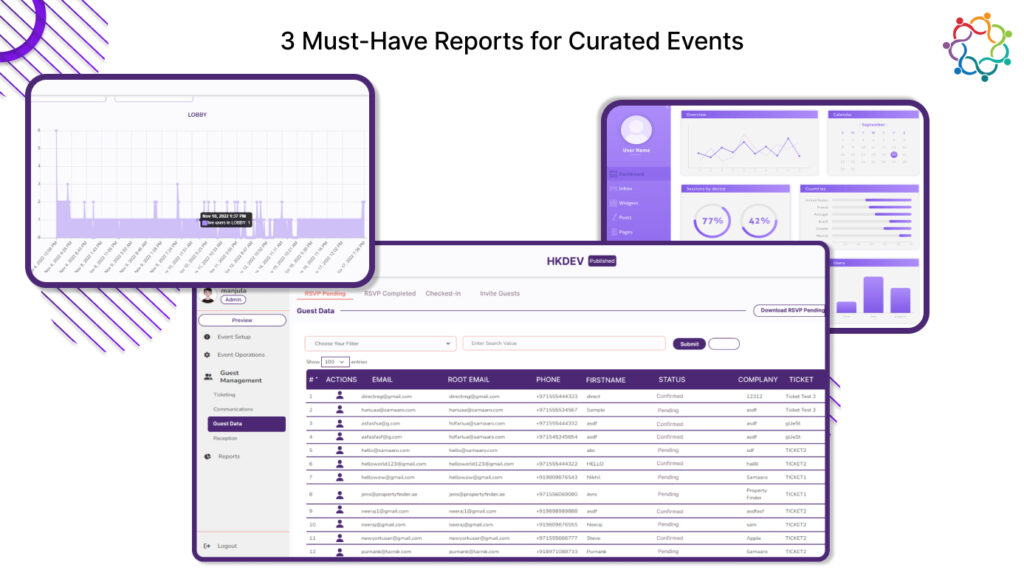
Traditionally, measuring the success of a curated event relied heavily on headcounts. But did those attendees truly engage with the content? Did they forge valuable connections? These crucial questions often remained unanswered, leaving you with a one-dimensional view of your event’s impact.
Enter Samaaro’s event management platform. Its powerful tools go beyond simply managing registrations and sending emails. How? It offers a suite of comprehensive reporting features and invaluable analytics that shed light on attendee engagement and transform the way you measure success.
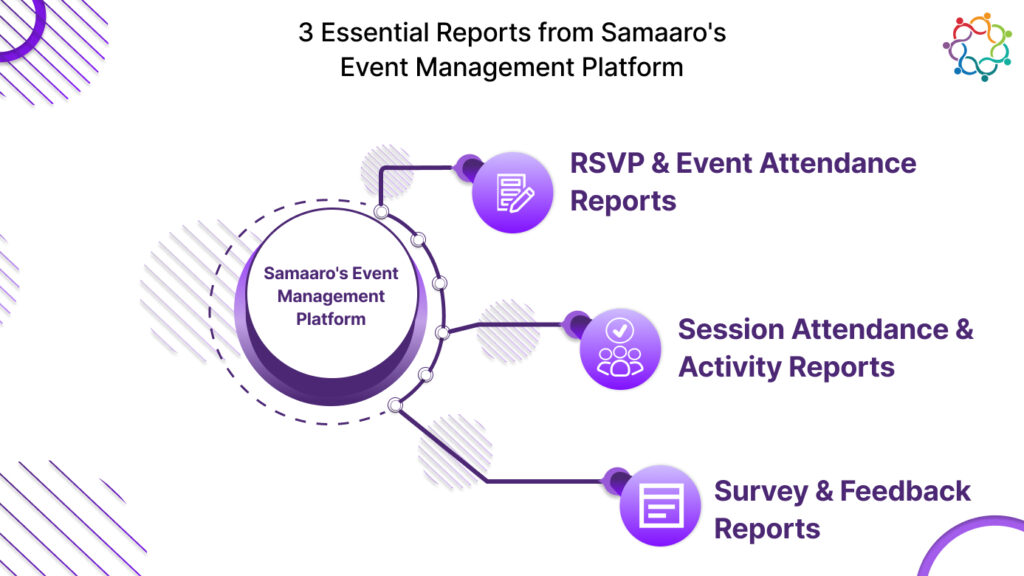
Reporting features within Samaaro’s event management solutions provides all-inclusive data at your fingertips, helping you gain a 360-degree view of your event’s success. Here’s a look at the 3 types of reports we offer:
Detailed event attendance reports from Samaaro’s software for event management let you track no-shows and RSVP conversion rates. They reveal how many attendees who RSVP’d “Yes” actually showed up and when. Our RSVP reports can help understand attendee patterns, empowering you to develop targeted strategies to minimize last-minute cancellations and ensure a higher turnout for future events.
These reports offer a deeper understanding of the attendee profiles, including their backgrounds, interests, and even purchase intent. This empowers you to target lead generation efforts more precisely and attract the right audience which aligns perfectly with your event’s goals.
Samaaro’s software for event management provides in-depth session reports, revealing the sessions that attracted the most attendees, average duration of attendee participation in each session, and overall movement of the attendees across sessions. Our activity reports shed light on which handouts, presentations, or other downloadable materials attendees accessed the most. Plus, they help identify sessions that generated the most polls or sparked lively discussions through Q&A features.
The activity data helps you identify topics of high interest and refine your future content strategy accordingly. Furthermore, these reports reveal the attendees’ preferred learning styles, allowing you to modify the session formats for optimal engagement.
Samaaro’s integration with survey tools allows you to collect post-event feedback on everything, from the contents’ relevance and clarity to the speakers’ expertise and presentation style. It also lets you assess attendee satisfaction with the venue, catering, technology, and overall event logistics.
This feedback loop lets you pinpoint areas that exceeded expectations and identify aspects that require refinement, ensuring continuous improvement of the event experience.
While curated events lack the public fanfare of large conferences, their success hinges on achieving specific goals. This is where reports and analytics come into play. By providing insights into everything from speaker performance to attendee engagement, these tools empower you to measure success, identify areas for improvement, and ultimately refine your curated event strategy for future iterations. Read on to know how you can benefit from Samaaro’s reports and analytics:
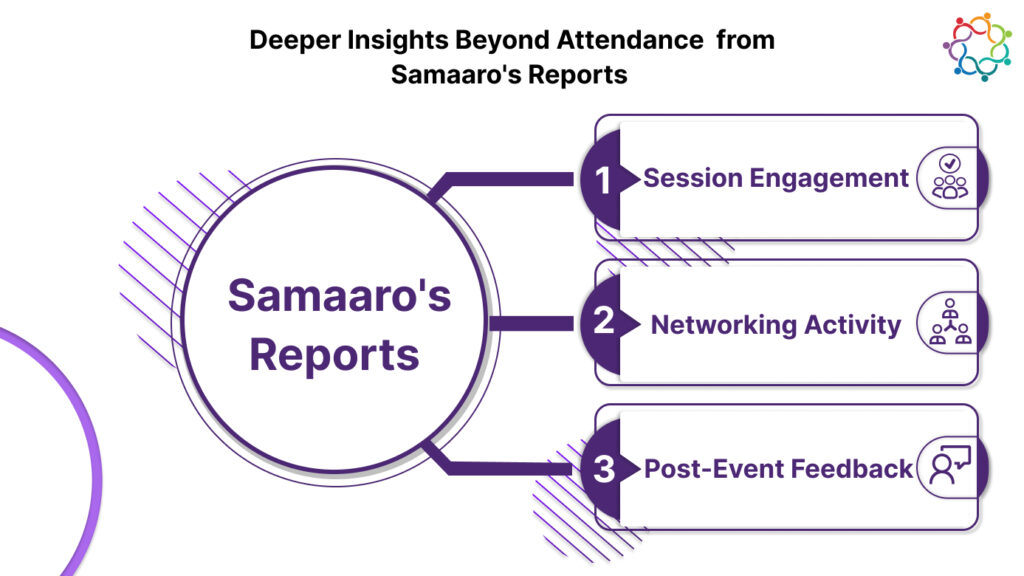
Gaining a window into attendee engagement uncovers which sessions sparked the most discussion and identifies the trends in networking activity. This granular data allows you to go beyond surface-level attendance metrics and reveals what truly resonated with participants. Here’s a deeper look at the insights our software for event management offers:
1. Session Engagement
Data on session engagement becomes invaluable when planning future events. You can prioritize outreach to speakers who not only deliver strong content but also inspire lively engagement, ensuring your audience actively participates and gets the most out of the experience.
2. Networking Activity
Insights into networking activity provide a valuable metric for measuring ROI. High levels of follow-up discussions, connections made, or even deals initiated suggest that your event successfully fostered valuable interactions.
3. Post-Event Feedback
By actively seeking feedback and acting on suggestions, you can demonstrate a commitment to attendee satisfaction. This promotes trust and strengthens relationships with attendees, encouraging them to return to future events and potentially become your brand’s advocates.
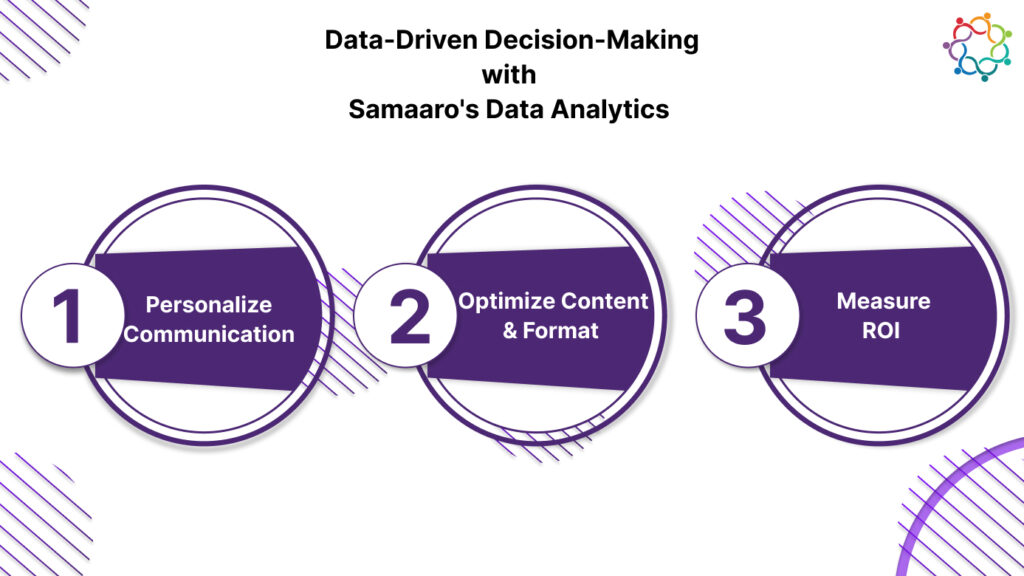
By transforming raw data into actionable insights, you can personalize communication with the attendees, optimize content and format, and ultimately, create events that resonate and deliver lasting value. Here’s a look at how the insights from Samaaro’s event management solutions facilitate data-driven decision making:
1. Personalize Communication
Tailor pre-event emails to highlight specific sessions or networking opportunities relevant to each attendee based on factors like their interests or even previous event participation. The personalized approach ensures attendees receive the information most valuable to them and increases their likelihood of participating in your curated event.
2. Optimize Content & Format
Reports on attendee engagement can reveal areas where attendees lack knowledge or require deeper dives into specific topics. This empowers you to adjust future content by including additional resources or dedicated workshops to bridge these knowledge gaps.
3. Measure ROI
Capturing data on how many attendees created high-quality connections, gained valuable knowledge, or felt the content directly aligned with their needs is a crucial factor in ROI measurement. This data not only highlights attendee satisfaction but also helps assess your curated event’s effectiveness in driving business.
The reporting features of Samaaro’s event management platform empower you to understand session engagement, identify learning preferences, and measure the true impact of your event beyond just attendance figures. Start your free trial today and experience the difference data-driven decision-making can make.
Juggling spreadsheets, sending countless emails, and chasing down RSVPs can quickly drain the excitement out of planning your next event. But what if there was a way to streamline tasks, boost engagement, and generate valuable leads – all while saving you precious time? Samaaro’s event marketing automation offers a powerful solution, transforming the event from a logistical headache into a strategic opportunity for success. Before we dive into the features that make this possible, let’s understand why we need automated marketing in the first place.
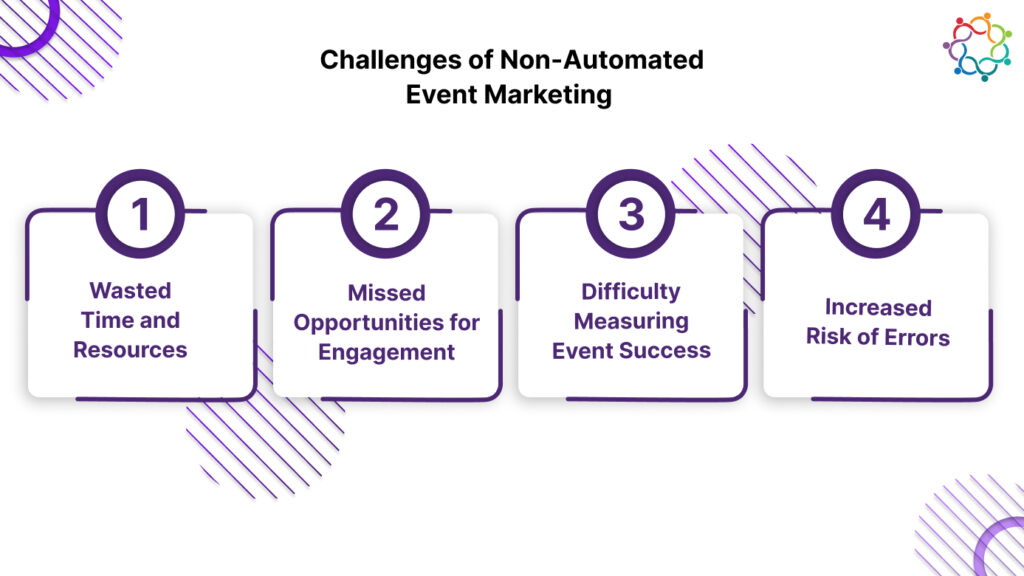
Event marketing automation is not just about efficiency; it’s about measuring the success of your events. Here are the reasons relying on manual processes makes measuring the results difficult:
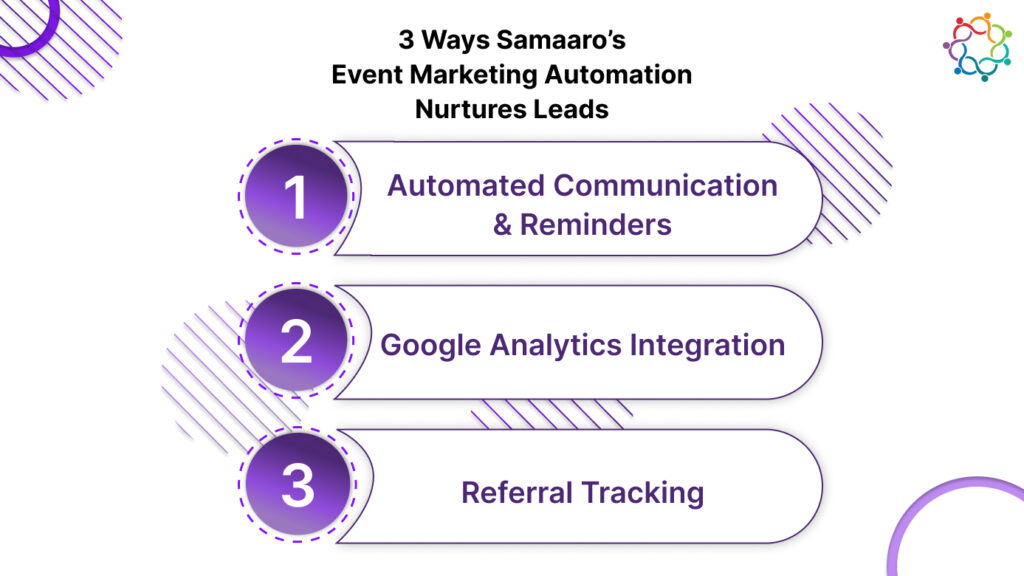
Marketing automation for events with Samaaro will allow you to oversee the complete lifecycle of your event, all while using automatically generated emails and reminders, Google Analytics integration, and referral tracking. Read further to learn about the features of the Samaaro Marketing Event Automation.
Automatically generated email sequences with Samaaro’s registration tool will allow you to never have to worry about contacting your attendees, target invitees, or even just thanking participants all to advance the lifecycle of your event. These emails can also be useful when it comes to reaching out to leads at the right time with important deadlines, pre-event information, session details, etc.
Samaaro’s RSVP solution generates automatic reminders for leads who have not yet RSVP’d, therefore you can account for their attendance appropriately.
Benefits-
In addition to automating your use of registration and reminder software, you are creating a more efficient and engaging experience for everyone! If you determine that your attendees may or may not register, then you have the option of sending an automatic pre-event communication campaign with additional value such as a teaser of the content that they could learn or feature big name speakers.
In addition to marketing automation, deeper insight into your audience becomes available! Samaaro offers an integration with Google Analytics to obtain additional knowledge about their audience behavior and the return on investment on their pre-event marketing efforts. It assists in monitoring key metrics such as website traffic, user interactions, and sources of referrals for event registration/web pages.
Advantages –
These key metrics along with the information provided in Samaaro’s event registration software give you a complete view of the marketing effort, as well as, what marketing channels are delivering the most valuable leads.
Samaaro automatically creates UTM codes for each marketing channel, whether your send an email campaigns or create) partner websites. UTM codes are easily incorporated into any promotional links or emails. When a visitor clicks on a referral link, the UTM code instantly attaches to their browser activity. Samaaro delivers where the referral came from.
Benefits –
The referral tracking allows you to proactively track which channels and/or partners deliver the most registrations, giving you the insights to focus on effective marketing sources. Through this data, you know which channel is yielding qualified leads to invest your marketing budget effectively and strengthen relationships.
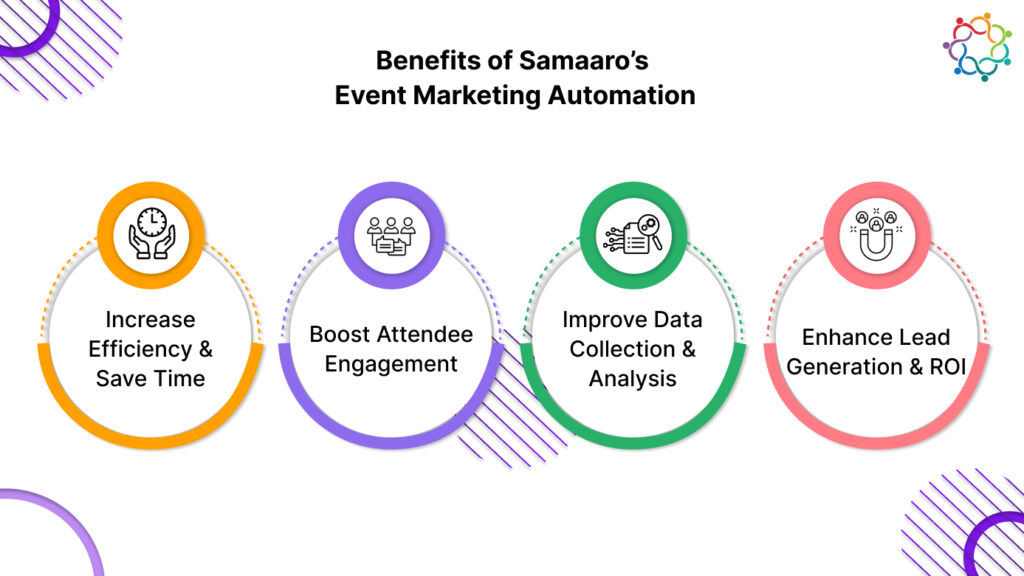
Samaaro’s marketing automation for events can unlock a treasure trove of valuable data, empowering you to move beyond guesswork and make strategic decisions based on attendee behavior. Read on to understand its benefits in detail:
Increase Attendee Engagement – With automated email sequences, your attendees will be educated pre-event, as well as feel excited about the event experience you will be creating. When an attendee receives emails tailored to their interest, they are more likely to open, read, and click through to find out more. The results will be reflected as increased engagement with your pre-event content and ultimately in your event.
Collect & Analyze Data Better – Samaaro’s integrations with multiple tools will give you more depth and breadth into your responses from your pre-event communications, the event data, and post-event data what the attendees did or didn’t engage with. This data will allow you to optimize the attendee journey for future events.
Increase Lead Generation & ROI – Many of the ways our event registration software will work for you, is giving you historical data on the audience demographic that produced the highest-quality leads. Use this knowledge to tailor your marketing efforts and a similar audience for future events. Using our reports on engagement metrics will show you the leads quality of the engagement and then empower your new marketing strategy to maximize your return on your investment.
By personalizing communication, targeting high-value leads, and leveraging powerful analytics, you can unlock the true potential of your events and achieve a significant return on investment. Start your free trial with Samaaro today and start automating your events for maximum ROI.

Built for modern marketing teams, Samaaro’s AI-powered event-tech platform helps you run events more efficiently, reduce manual work, engage attendees, capture qualified leads and gain real-time visibility into your events’ performance.
Location
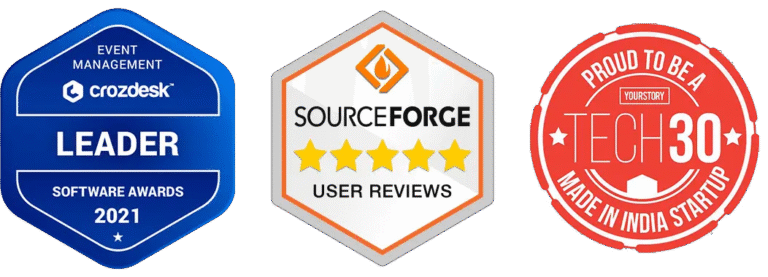
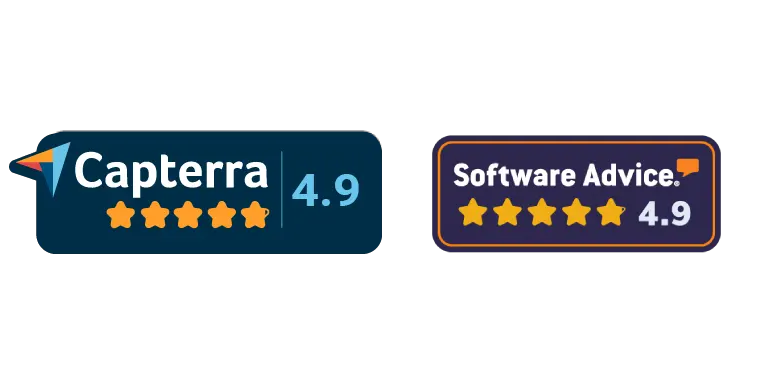
© 2026 — Samaaro. All Rights Reserved.